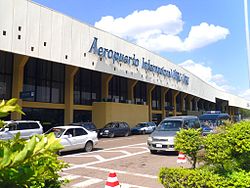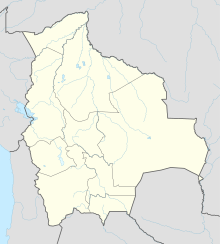Viru Viru International Airport
Viru Viru International Airport Aeropuerto Internacional Viru Viru | |||||||||||
|---|---|---|---|---|---|---|---|---|---|---|---|
 | |||||||||||
| Summary | |||||||||||
| Airport type | Public | ||||||||||
| Operator | NAABOL | ||||||||||
| Location | Santa Cruz de la Sierra | ||||||||||
| Opened | 1983 | ||||||||||
| Hub for | |||||||||||
| Focus city for | Boliviana de Aviación | ||||||||||
| Elevation AMSL | 1,225 ft / 373 m | ||||||||||
| Coordinates | 17°38′41″S 63°08′07″W / 17.64472°S 63.13528°W | ||||||||||
| Website | www | ||||||||||
| Map | |||||||||||
 | |||||||||||
| Runways | |||||||||||
| |||||||||||
| Statistics (2015) | |||||||||||
| |||||||||||
Viru Viru International Airport (IATA: VVI, ICAO: SLVR) in Santa Cruz de la Sierra is Bolivia's largest international airport. Viru Viru handles domestic, regional, and international flights from Bolivia, North America, South America and Europe and serves as a focus city for Bolivia's biggest airline Boliviana de Aviación. The airport is able to handle large aircraft such as the Boeing 747-400, Airbus A340-600 and Boeing 777-300ER.
History
[edit]The idea of having an airport in the city of Santa Cruz de la Sierra was conceived in 1965 by General René Barrientos,[3][4] former president of Bolivia, with the intention of creating an intercontinental airport. Shortly thereafter, construction of the airport began until it was completed and inaugurated in 1983, to replace the obsolete El Trompillo Airport.[citation needed] Upon its inauguration, Viru Viru became a main gateway for international flights. Lloyd Aéreo Boliviano used Viru Viru as a hub before ceasing operations in 2008.[citation needed] On 1 March 1997, the government of Bolivia entered into a 25-year contract with Airport Group International to operate the three largest airports in Bolivia — El Alto International Airport in La Paz, Jorge Wilstermann International Airport in Cochabamba and Viru Viru International Airport.[citation needed] Servicios de Aeropuertos Bolivianos Sociedad Anonima (SABSA) was created to operate the concession. In 1999, Airport Group International was purchased by TBI plc. In 2004, Spain's Abertis/AENA purchased TBI. SABSA has been substituted in March of 2022 by the newly established government agency Navegación Aérea y Aeropuertos Bolivianos (NAABOL). This state-owned agency now manages the airports in Bolivia. [5]
Name
[edit]The name "Viru Viru" originates from the indigenous Guarani language spoken in the area. Most likely, "Viru Viru" refers to a toponym or a distinctive geographical feature after which the airport was named.There is some ambiguity about the meaning of it based on sources in the internet. Different meanings have been proposed:
- Some say it means "round object" or "round place", referring to a nearby hill that has a circular shape, resembling a round object.
- Others say it refers to a river that has now disappeared and was located 13 kilometres from the city. The tributary was in the same pampa where the airport was built.[6]
- Lastly, it could mean "pampa, plain", which was the name of the whole geographical area of the place where the airport was built.[7]
Today, some researchers claim that the correct spelling of the term would be "Birubiru".[8]
Airlines and destinations
[edit]Passenger
[edit]Cargo
[edit]| Airlines | Destinations |
|---|---|
| TAB - Transportes Aéreos Bolivianos | Cochabamba, La Paz, Miami - Future: Recife, Madri-Barajas, Cuiabá, Brasília-DF, Lisboa, Bogotá, Cáli, Belém-Val de Cãs, Sevilla, Havana, Santo Domingo-Las Américas |
| AerCaribe | Lima ; Future: Iquitos, Goiânia, Salvador, Bogotá, Panamá City - Tocumen |
Statistics
[edit]Top destinations
[edit]| Rank | City | Passengers | Top carriers | % Change |
|---|---|---|---|---|
| 1 | 386,496 | American Airlines, Boliviana de Aviación | ||
| 2 | 372,773 | Boliviana de Aviación, Gol Airlines | ||
| 3 | 358,943 | Aerolíneas Argentinas, Boliviana de Aviación | ||
| 4 | 348,603 | Air Europa, Boliviana de Aviación | ||
| 5 | 278,277 | Copa Airlines | ||
| 6 | 268,584 | Avianca Ecuador, LATAM Perú | ||
| 7 | 94,733 | Amaszonas, LATAM Chile | ||
| 8 | 79,962 | Amaszonas, LATAM Paraguay |
References
[edit]- ^ "Aeropuerto Intl. El Alto - Bienvenidos a la Paz". Archived from the original on 31 May 2011. Retrieved 17 December 2015.
- ^ "Archived copy" (PDF). Archived from the original (PDF) on 11 November 2014. Retrieved 25 October 2015.
{{cite web}}: CS1 maint: archived copy as title (link) - ^ Arce San Martín, Santiago R. (16 April 2008), "Liderazgo en Bolivia", Opinión Bolivia, retrieved 9 December 2022
- ^ "Bolivia sin una verdadera puerta de conexión al mundo". Datos-Bo. 13 June 2018. Retrieved 9 December 2022.
- ^ "Gobierno anuncia que SABSA pasará a NAABOL y ofrece a trabajadores formar parte de la institución".
- ^ ultracasas.com - 5 datos que NO CONOCÍAS acerca del Aeropuerto de VIRU VIRU
- ^ https://www.flickriver.com/photos/dan59/4540707944/ flickriver.com - Aeropuerto Internacional Viru Viru
- ^ ultracasas.com - 5 datos que NO CONOCÍAS acerca del Aeropuerto de VIRU VIRU
- ^ "Tráfico de pasajeros – Origen/Destino Servicio Regular Internacional" (PDF). Dirección General de Aeronáutica Civil (Bolivia) (in Spanish). January 2017. Retrieved 9 May 2017.

